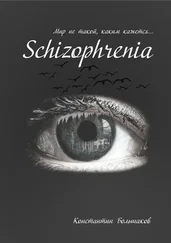226 213
227 214
228 215
229 216
230 217
231 218
232 219
233 220
234 221
235 222
236 223
237 224
238 225
239 226
240 227
241 228
242 229
243 230
244 231
245 232
246 233
247 234
248 235
249 236
250 237
251 238
252 239
253 240
254 241
255 242
256 243
257 244
258 286
259 287
260 288
261 289
262 290
263 291
264 292
265 293
266 294
267 295
268 296
269 297
270 298
271 299
272 300
SCHIZOPHRENIA
An Unfinished History
Orna Ophir
polity
Copyright © Orna Ophir 2022
The right of Orna Ophir to be identified as Author of this Work has been asserted in accordance with the UK Copyright, Designs and Patents Act 1988.
First published in 2022 by Polity Press
Polity Press
65 Bridge Street
Cambridge CB2 1UR, UK
Polity Press
101 Station Landing
Suite 300
Medford, MA 02155, USA
All rights reserved. Except for the quotation of short passages for the purpose of criticism and review, no part of this publication may be reproduced, stored in a retrieval system or transmitted, in any form or by any means, electronic, mechanical, photocopying, recording or otherwise, without the prior permission of the publisher.
ISBN-13: 978-1-5095-3648-1
A catalogue record for this book is available from the British Library.
The publisher has used its best endeavors to ensure that the URLs for external websites referred to in this book are correct and active at the time of going to press. However, the publisher has no responsibility for the websites and can make no guarantee that a site will remain live or that the content is or will remain appropriate.
Every effort has been made to trace all copyright holders, but if any have been overlooked the publisher will be pleased to include any necessary credits in any subsequent reprint or edition.
For further information on Polity, visit our website: politybooks.com
The first time I encountered a person diagnosed with schizophrenia in a psychiatric hospital, I was 16 years old. My mother took me to visit Orlean, her friends’ daughter, who was only three years older than I was. A bright, beautiful, outgoing young woman, Orlean, so I was told, had a “mental breakdown” following a breakup with her high school sweetheart. This young woman, whom I admired and looked up to, was in a one-size-fits-all pink, tattered hospital gown. Her long black hair somewhat unkempt, her lips chapped and blood-red, her pupils so dilated that her big hazel eyes were almost invisible. She had a very strange expression on her face, as if she was there, with us, but uncannily also absent. The three of us sat outside on the lawn, next to the “adult semi-open ward” of Shalvata Hospital. Shalvata stands for serenity in Hebrew. The hospital looked like a kibbutz. The rural landscape, the wild monk parakeets in the trees, and the plain frugal architecture gave it the appearance of a utopian, peaceful place. As I observed the patients around us, an eerie feeling started to creep in. They seemed different. An older lady was conversing with an unseen other on a bench, a man in his fifties was picking up a cigarette butt, trying to light it, and then there was a deep loud roar, a bellow, that culminated in continuous, repetitive begging: “Get me out of here! Get me out of here!”
Five years after this visit, following a brief detour through the Bezalel Academy of Art in Jerusalem, I decided to become a clinician. As an undergraduate majoring in psychology, I volunteered in the adolescent ward at that very same hospital. For three years, I worked with children aged 12–18. Their stay was always involuntary, and always involved a high risk of suicide. I observed these terrified, haunted, confused kids, living in their own nightmarish universe, seeing things only they could see, and hearing voices no one else could hear. And I saw their brokenhearted, helpless parents. I witnessed many of them receiving help, gently cared for, and being heard. Many left the ward calmer and more organized. Some returned in a state of crisis.
The staff meetings in the director’s office, recounting the ups and downs of daily life on the ward, were fascinating. Interviews of patients by senior psychiatrists, followed by extensive discussions and deeply informed by psychoanalytic theory, were simply mesmerizing. In the adjacent room, dangerously agitated patients were restrained to their beds. It wasn’t a pleasant sight, and the sounds coming from it made a strong impression on me. Although I worked with the “kiddos” as we called them, every now and then I saw Orlean, who moved between the closed and the semi-open wards, between wearing a hospital gown and her own clothes. She had put on a lot of weight. Her teeth had darkened from the cigarettes she compulsively smoked.
A year later, I returned to the hospital, this time as a graduate student in clinical psychology, to fulfill the requirements of a practicum in the context of the semi-open, adult ward. There, I was assigned patients, offering them psychotherapy and psychodiagnosis. I viewed the – at times, miraculous – immediate effect of tranquilizers on agitated patients who were in severe mental pain, and I saw the deleterious effect of their chronic use. At the same time, I conducted extensive research for my Master of Arts (MA) thesis about schizophrenia and L-tryptophan, a natural amino acid found in many plants and animals that the body turns into the neurotransmitter serotonin. While most drugs for schizophrenia were based on the “dopamine hypothesis,” and the need to treat patients’ “mad” thoughts and behavior by blocking dopaminergic receptors, this new research offered to study substances that could help with the memory dysfunction many of these patients were suffering from.
Most of the patients I saw at the hospital were diagnosed with schizophrenia. Among them, Ms. M. who did not get out of her bed for three months fearing “the man from the radio” would harm her only son, if she dared to move; Mr. A. who believed he was on a mission with Mossad and insisted that I had the “codes”; and Mr. O. who had been involuntarily committed to the ward after he had tried to kill his mother, whom he believed was an Iraqi spy that had taken her place. It was not easy to establish a therapeutic relationship with these suffering patients, but once it happened, I found their stories to be both intriguing and excruciating. Every week, I saw Orlean, as she came for her treatment at the outpatient clinic. She had begun a relationship with another patient in the clinic (who was also diagnosed with schizophrenia) and told me that she was “doing well.”
A couple of years later, when I returned to the same hospital as an intern clinical psychologist, I was assigned one intensive case. Mr. N. was a 56-year-old man, diagnosed with disorganized schizophrenia, who lived with his psychotic mother, a survivor of the Nazi concentration camps, with whom he shared a delusional world in which he was still her little baby. I saw both of them together, as she gradually made the transition to a psychiatric nursing home. Mr. N. almost died due to complications related to his antipsychotic medication, and as a response to the upcoming separation from his mother. I met with him three times a week for an hour and wrote an extensive case study based on this treatment for the State Board exam. As it turned out, this was the first time that a patient diagnosed with schizophrenia was presented in this context. But it was not the last. When I returned to the hospital as a specialist in clinical psychology, I encouraged students, interns, and residents to carefully listen to these patients, as they try and find meaning and purpose in what otherwise sounded so unreasonable and, at times, plainly horrifying. Meanwhile, Orlean got married and the couple moved into a small apartment purchased by her parents. They attended a nearby psychiatric rehabilitation center on a daily basis, and I saw her once in a while when she came for her follow-up sessions at the clinic. Though she had prematurely aged, she seemed content with her relationship.
Читать дальше












